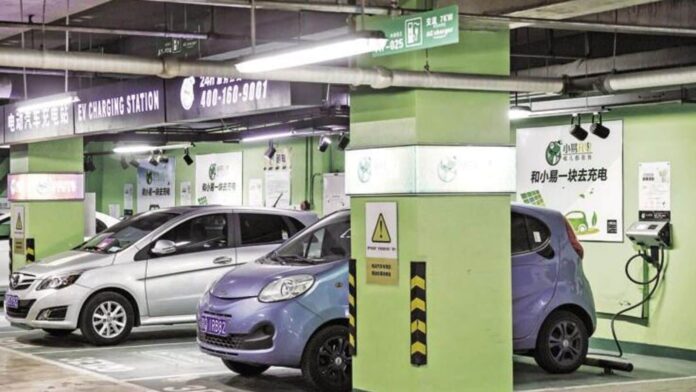The country’s on-road EV count includes 2.6 million two-wheelers, 2 million three-wheelers, 300,000 four-wheelers and over 10,000 buses. Collectively, the plying of these zero-emission vehicles has reduced carbon emissions by an estimated 10 million tonnes.
This EV growth story underlines our commitment to ambition coupled with action. A growing hub for EVs and their components, India has been pushing the boundaries of innovation and investment in green mobility solutions.
The past decade has been the harbinger of a paradigm shift in Indian mobility. Under the leadership of Prime Minister Narendra Modi, India witnessed the pulling of policy levers that catapulted EV adoption across various segments.
Catalytic schemes reflect the government’s confidence in EV adoption to help meet climate targets. Together, central and state government schemes have invested $15.1 billion in electric mobility. Additionally, startups in this space have received $6.4 billion in private funding.
Balancing growth with sustainability is a marathon, not a sprint. We need carefully calibrated and long-term solutions that can sustain India’s growth along low-carbon pathways.
The implementation of the draft Corporate Average Fuel Efficiency (CAFE) norms, prepared by the Bureau of Energy Efficiency (BEE), can consolidate progress towards a net-zero economy by accelerating the decarbonization of transport.
The 10-year roadmap (for 2027-2032 and 2032-2037) has set automakers an emission cap of 91.7gm carbon dioxide per kilometre under CAFE III and 70gm CO2 per km under CAFE IV. CAFE norms were first notified in 2018 with a target of 130gm per km by 2022-23 and 113gm per km 2022-23 onwards.
The BEE’s proposed norms would use Worldwide Harmonised Light Vehicle Test Procedures for determining emissions and fuel consumption, replacing the Modified Indian Drive Cycle method. This transition will align India’s testing procedures with international standards, providing more accurate data on those counts.
The implementation of these draft norms offers India an opportunity to leverage ongoing progress in the EV ecosystem. A renewed effort by automakers to expand their EV offerings can be a viable way to meet these norms, as EVs get ‘super credits’ under existing norms.
The gradual tightening of permissible CO2 emissions under CAFE norms, coupled with the ‘volume derogation’ offered under the super-credit system on EV manufacturing, can allow automakers to offset less efficient vehicles and reduce their overall cost of compliance.
The application of a ‘derogation factor,’ which acts as a multiplier to provide allowances or credits for low-carbon vehicles, can thus help automakers meet their CAFE targets.
The case for CAFÉ norms has been well established globally. As of 2023, over 99% of EV sales were observed in markets with such norms. This cases of Europe, China and California in the US make this point clear. In the EU, the market share of EVs jumped from 3% to 19% between 2019 and 2021 as carbon emission standards were implemented.
These compliance norms also serve as motivators for manufacturers to invest in EV innovation and accelerate economies of scale to reduce unit costs and help the EV industry reach a tipping point. Such supply-side norms also push producers to leverage their combustion-engine vehicle profit margins to subsidize EVs.
Fuel efficiency norms also encourage the adoption of innovative financing and business models that can help overcome high capital costs and unlock cost savings.
Well-designed CAFE norms can also enable automakers to buy credits from other manufacturers with excess credits as an interim measure. The US lets such credits be carried over for 5 years into the future or 3 years into the past. This enables automakers to plan new models without having to bear the stress of incremental norm-tightening.
In a rapidly growing economy like India, CAFE implementation will increase investor confidence.
Given the bouquet of existing schemes aimed at domestic production and self-reliance, these norms can speed up the development of a robust EV ecosystem, complete with widespread networks for battery charging and other utilities, even as clean-tech investments create new jobs.
A study done for US-made cars predicted that for all cars built from 1983 to 2031 (forecast), an incremental tightening of CAFE standards could save up to 57 billion litres of fuel and 155 million tonnes of CO2 emissions.
A similar emission reduction pathway can be done for India to reveal the benefits of Indian traffic going electric.
The government’s policies and financial support have nurtured a vibrant ecosystem for clean mobility.
By integrating climate action with economic ambition, India is not only paving the way for a cleaner future, but also solidifying its role as a global economic powerhouse, while inching closer to its vision of a ‘Viksit Bharat’ by 2047.
A carefully curated approach to the implementation of CAFE norms could bolster India’s transformation into a decarbonized economy as it aims for carbon neutrality.
These are the author’s personal views.
The author is professor of practice, Indian Institute of Technology, Roorkee.
#CAFE #comfort #fuel #efficiency #norms #speed #clean #mobility #India
